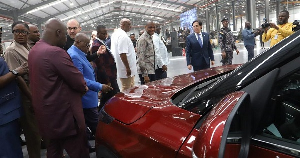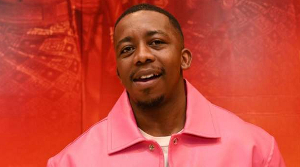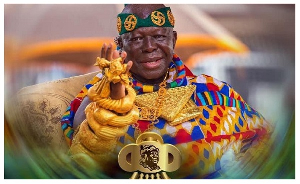- Home - News
- TWI News | TV
- Polls
- Year In Review
- News Archive
- Crime & Punishment
- Politics
- Regional
- Editorial
- Health
- Ghanaians Abroad
- Tabloid
- Africa
- Religion
- Election 2020
- Coronavirus
- News Videos | TV
- Photo Archives
- News Headlines
- Press Release
General News of Wednesday, 29 November 2006
Source: Convention People’s Party
Budget 2007 Fails to Address the Basic Needs of Our People! – CPP
IT’S POVERTY OF IDEAS AND CONFUSION OF ECONOMIC THINKING.
Ladies and Gentlemen of the media, it is with great honour and a sense of duty that once again we comment on the affairs of our beloved country Ghana.
Once again the Kufour NPP government has woefully failed to address the basic needs of our people by presenting a budget which is a “recycle” of failed ideas without any new bold and radical policies to arrest deplorable mass poverty, pervasive illiteracy, prostrate external dependence on “foreign hand-outs” and workless ness in Ghana.
The CPP (UK & Ireland Branch) like most Ghanaians are very disappointed with the NPP government’s inability to translate its electoral sloganeering of “Positive Change- Part 1 & 2” into concrete actions. Rather it continues to implement the same old failed policies under the tutelage of the IMF/World Bank which has never worked in any country.
The NPP like its predecessor-the NDC- has since assumption of office promoted a style of economic development policies which has often been insensitive to the basic needs of ordinary Ghanaians and to the environment. Indeed, since 2001, the NPP’s claim its economic focus is on wealth production than wealth distribution, production for export than for the needs of local population, extraction of natural resources rather than environmental protection, and trade liberalisation which is completely ‘killing’ local industries.
As so-called “Property Owning Democrats”, the NPP government has typically pursued policies which serve the rich elite at the expense of the poor, which neglect the economically disconnected and those living in remote areas, and which reflect short-term expediency rather than long-term survival.
As ‘market fundamentalists’, the NPP and its so-called Capitalist class have failed to learn one basic fact in economic policy. That is, markets are never as efficient as theories make out, and in developing countries like Ghana they are very prone to “failure”.
The economic ‘miracles’ of the Asian Tiger economies like South Korea, Taiwan, Singapore, Japan, Malaysia etc are routinely invoked in support of the argument that so long as the market and the private business are left to their own devices, all will be well. That is certainly not the view from Japan, South Korea, Singapore, Malaysia, and Taiwan, where economic transformation has been built on careful STATE INTERVENTION.
The success of Japan, South Korea, Taiwan, Singapore and China has been due to the pervasive and prolonged STATE INTERVENTIONS they undertook to remedy such ‘market failures’(as dictated by the IMF/World Bank under P/NDC and NPP), by building up education, protecting local infant industries, fostering indigenous technological activity and promoting local enterprise by restricting foreign entry. The Asian Tiger Economies pattern of intervention differed radically from what our governments have been doing, but in all aspects of economic policy they have been committed to STATE INTERVENTIONS NEVERTHELESS.
If the NPP ‘market fundamentalists’ and their so called capitalist class would like to use Singapore, Taiwan, Malaysia, South Korea and Japan as the role models, the fact is, in all these countries, government retains the central role in economic development.
Since 2001, the NPP’s economic programme has tried tamely to pursue some form of state intervention policies like the ownership of VALCO, the provision of mass transportation, the capitation grant and school feeding programmes, and although they are laudable, the approach has been very inconsistent due to their ideological dogma as ‘market fundamentalists’.
Not even our President’s numerous travels to Asian Tiger Economies seem to lead to a change in policy direction- the 2007 Budget is the “same old story”, a complete poverty of ideas and confusion of policy thinking. Their prescriptions fall far short of what we believe is required to develop and transform our nation.
The preamble to any notes on Budget 2007 is that as a nation we remain prisoners of our past. The IMF/World Bank policy prescription under the P/NDC and the NPP with its Structural Adjustment appendage of HIPC policy has lead to unbridled privatisation and trade liberalisation which has completely destroyed local industries.
The NPP 2007 Budget has very little to say on the direction of Agriculture- as a nation our agriculture is still based on cutlasses and hoes mentality with huge tracks of lands lying fallow whilst we import rice, poultry products at the expense of local industries.
It is worth noting that whilst wealth is created by both agriculture and industry, wealth tends to increase in proportion to greater mechanisation of production. The 2007 Budget failed to address these basic needs of our economy -development of manufacturing based industries that are linked to a robust agrarian policy which will enable us to eat what we produce and create jobs for the millions of unemployed youth in our country.
The CPP view of what needs to happen in Ghana is this:
• Agriculture must be modernised
• Employment must be linked to both Agriculture and Industry
• More employment in the field of manufacturing. • Structure of Ghana’s exports must change from reliance on primary products and raw materials to a greater concentration on processed, finished and industrial export.
• The structure of production must be progressively transformed by the development of technology.
• We must aim to maximise the rate of adoption of modern technology and the rate of productive investment.
• Ghana’s ultimate economic emancipation will also depend upon greater African political and economic Unity.
Every budget must be measured on progress against the above so how thus Budget 2007 fare?
Overall the 2007 NPP government budget shows “business as usual” complacency with rhetoric on “Poverty Reduction” rather than a Budget that addresses the basic needs of our people- the right to have nutritious food, access to primary health care delivery, good drinking water, low-cost housing and jobs. It talks about “Creating wealth and sharing wealth” but most Ghanaians would agree with us that whilst there has been great wealth sharing among Ministers and their cronies very little has reached the general population. It was good to be informed about economic performance in other countries by the budget but the Minister and his team should in future link that to the effect on Ghana’s economy i.e. how performance in a particular country affects our exports, our trade and our development generally.
Confusion on Debt
Many Ghanaians have recently been of the opinion that Ghana’s debt has been totally wiped clean and thus the Ministers statement that debt has fallen from 24% of GDP to circa 11% requires explanation and also why External Debt servicing is up.Many believed Ghana’s debt stood at about US$6,000million in 2005; now we are told the amount had been US$8,382.5 million which after debt relief is down to US$4,670.59 million – the government really needs to start getting its figures right on such important issues.
Its projected growth for 2006 has been revised upwards and yet total receipts fall below target.
For all the emphasis that is constantly placed on external friends and external assistance by the NPP Government Multi lateral HIPC assistance fell below target, proof that we should not believe in everything that our so called donor friends say.
Investment Outlays for 2006 are down, close to 20% lower than estimated, and thus why should anyone accept the projected increases for 2007.
We welcome the fact that Multilateral Debt Relief is to become more transparent following repeated suggestions from the CPP and will become introduced as a line in the fiscal framework, so that at least we all know what the money is spent on. We must all keep a keen eye on future budgets.
Government is Borrowing More Despite Claims………
Despite claims of better management this government is borrowing more. Domestic Financing of the Budget for the first three quarters of the year amounted to a net borrowing of ¢2,846.4 billion, against a budget target of ¢870 billionOverall Budget Balance
The overall budget balance is projected to record a deficit of ¢5,591.8 billion, equivalent to 4.9 per cent of GDP compared to the budget estimate of 4.5 per cent of GDP. The domestic primary balance is also projected to be a deficit of 2.1 per cent of GDP against the budget estimate of a deficit of 1.4 per cent of GDP. As a result, the main fiscal anchor - domestic debt-to-GDP - is projected at 10.1 per cent against a target of 8.7 per cent for 2006.Government Continues to Contract New Loans
By September 2006, The NPP Government had contracted nineteen (19) new loans from multilateral and bilateral sources totalling US$482.0 million. Many hope that there will be accountability against these new loans. During the same period, a total of 34 grants amounting to US$ 774.9 million had been contracted. The country should know if these come with any conditionalities.Money Supply Is Up
Money Supply up by 34%, petroleum prices have increased, tariff prices have increased, and yet we are told Inflation is falling – this can only be “Voodoo Economics” yet again from the NPP.Cedi Stability
We welcome Cedi stability but the main reason for Cedi stability is extra remittances by Ghanaians from abroad, rather than any magic formula or policy from Government. We all know why remittances from Ghanaians abroad has gone up- the fact is that it is due to increased economic hardship in Ghana under the Kufour NPP government, which has meant every Ghanaian has had to increase remittances to their families due to unbearable economic hardship.IMF
The budget notes “The Policy Support Instrument (PSI), introduced in October 2005, enables the IMF to provide support to low-income countries that do not want – or need – Fund financial assistance. The PSI helps countries design effective economic programmes that signal to development partners (donors, multilateral development banks, and markets) the IMF’s endorsement of a country’s policies.”It says further that “the Fund’s financial assistance is no longer required. However, being a “mature stabilizer”, the country will maintain a close policy dialogue with the IMF – seeking policy advice and obtaining technical assistance in the design, implementation, and monitoring our economic agenda, to promote our objectives and at the same time obtain the benefits of our relationship with the international community”.
The PSI simply abdicates Ghanaian sovereignty over its own affairs to a foreign institution, whose prescription for developing countries over the years has proved disastrous across the globe.
The CPP like most Ghanaians expected the NPP to have charted a different economic path and not allow the IMF to continue to subvert our sovereignty by rejecting the HIPC programme.
Much as we all accept that HIPC brought initial debt relief, the CPP like most discerning Ghanaians knew that the HIPC conditionality like trade liberalisation, privatisation, full cost recovery etc would worsen the Ghanaian economy and also restricting the government to access concessionary loans, grants.
We therefore welcome the government decision to access concessionary loans and grants. However, by declaring to wean itself from the IMF dictates whilst at the same time utilising its Policy Support and monitoring facilities is twisted logic.
How can the NPP government claim it is disengaging from IMF dictated policies but at the same time be under its influence via its Policy Support mechanisms, this is a big lie and the Kufour’s administration should be bold enough to tell Ghanaians that like most third world countries, they are fed up with the IMF- the NPP should “eat humble pie” by admitting that since 1983 we were re-colonised by the IMF/World Bank, the time has come to call it quits. If they do that then most Ghanaians will applaud such a bold decision but they should not use subterfuge to deceive Ghanaians.
The GPRS
The budget notes that “the GPRS II will further address the structural constraints at the policy and institutional levels that impede increased productivity, adoption of technology and competitiveness of the private sector with respect to agriculture, industry and service sectors. This will empower the private sector to effectively play its role as the engine of wealth creation and poverty reduction.We fail to see how the Poverty Reduction Strategy empowers the private sector to become an engine of wealth creation.
As with other areas of the budget there seem to be a lot of assertion and targets but failure to spell out the measures necessary.
Agriculture
On agriculture the budget aims are• Promoting selective crop development
• Modernizing livestock development
• Improving access to mechanized agriculture
• Accelerating the provision of irrigation infrastructure
• Increasing access to extension services
• Enhancing access to credit and inputs for agriculture etc
• Land under irrigation will be increased through underground and surface water exploitations. About 100 mechanized boreholes for irrigation purposes are to be drilled nationwide. A total of approximately 2,000 hectares will be put under surface irrigation.
Clearly the government’s favoured private sector features little in these aims and shows rather that plans for agriculture is largely facilitated by the State, with heavy state involvement. The government needs to be less timid on this front and accept that the State can do more. For-instance, it will be prudent for the government to make resources available for all the 138 District Assemblies to engage in massive agricultural activities to produce large scale local foodstuff, coupled with storage facilities for local consumption.
The noted aims of the Ministry of Food and Agriculture (MOFA) - “MOFA will promote the use of animal traction and small-scale farm 2 animal traction centres will be rehabilitated and MOFA staff as well as 50 farmers and farmer groups animated and trained on animal traction and use of appropriate farm machinery. A total of 500 Vari mini tractors, 125 Yukon Tractors and 1,000 Adler Flasher will be imported into the country to enhance farmers’ access to mechanized services including land preparation. A total of 1,000 John Deere Tractors will be imported to augment the current number of tractors in the country all serve to confirm our view that this is a “piece meal” approach in solving the food problems in our country.
In today’s NPP Ghana, we import plantain, tomatoes, onions and other foodstuffs from neighbouring countries where mechanised agriculture has been the bedrock for their industrial development.
Child Labour Elimination
We welcome plans around the National Cocoa Child Labour Elimination Programme, 2006 - 2011 aimed at preventing child labour in the cocoa industry in line with the child labour provisions of the Children’s Act, Act 560.On Lands we support sound land use and administration, and sustainable forest and wildlife management.
It is however hypocritical and tyrannical of Government to be talking about Cabinet approval of “the legal and institutional reforms for land administration to create an efficient, effective and transparent system “whilst moving to construct houses on lands belonging to the people of LA, Accra, without following due process.
On Energy: Since 2001, the NPP government has not added a single kilowatt of electricity to the national grid. The NPP Govt has not put in place any meaningful energy policy except that it believes the solution lies in the ‘market’ by pandering to the private sector to intervene but in its 6 years in office it still cannot come-up with a coherent national policy on renewable energy. In Ghana today, our people still rely on the forest as a source of energy by still cutting down trees and using them for cooking. This is modern Ghana under Kufour’s NPP. They have been caught napping several times with the power shortages, which has a direct impact on manufacturing and job creation so where lies the NPP’s “Golden Age of Business” when its policies or lack of it is destroying the very foundations of it economic programme. The government attempt to privatise the TOR without due process in line with its so-called
Procurement Act has raised some concerns.
Where is the transparency in the whole privatisation process of TOR? The NPP ‘market fundamentalists’ have lost touch with economic reality and their shallow ideological dogma is leading the entire country astray.
On Industry, the CPP is clear on the need for industrialisation and our policies took Ghana a long way on this path. After 6 years in government the NPP is now seeking to develop an Industry policy for the country and advertising for the procurement of Consultancy services to assist with the development of policy options.
The budget notes initiatives of providing seed-capital for a District Industrialization Programme, and “to leverage resources from the African Development Foundation (AFDF) to support the establishment of industries in the districts.
The Industry Ministry is to establish a Technology Centre for the manufacturing of capital goods to encourage agro processing. This is to be established with an integrated foundry, metalworking and machine tool facilities to produce selected parts, components and plants for food processing and agricultural production
The budget notes that each district project will be established as a Private Limited Liability Company with a professional management team, but it is clear that the main impact is by State involvement and thus once again overall government initiatives on industry are too timid instead of fully acknowledging that in our present situation only the State can enable meaningful progress to be made and be bold with State intervention and involvement.
Affordable Housing
The budget notes the construction of flats at various places Borteyman, Nungua, Kpone etc; this is a miniscule amount against the need of the great housing and homelessness problem across the country. T he government must realise that there must be a link between construction and need with proper targets being set annually.The current situation of insignificant builds per year and expensive development by GREDA developers does not constitute a serious housing policy, and would not meet the housing need of our society.
On Transportation - the budget notes delivery of batches as follows:
• Yaxing buses from China
• Jonckeere VDL Buses from Belgium
• Tata buses from India
• VDL DAF bus chassis from Holland
Surely the use of different types of buses must be confusing and cause a maintenance nightmare with parts etc.
We welcome the free bus ride to schools for children and this should be extended across the country and to the elderly.
On Health – the government seems short of any new ideas to increase access and improve the service.
We agreed that there need to be adequate funding to support services for exempt categories under the NHIS such as indigents, pensioners and children under 18 years, but the Government needs to spell out how much more funding. The government should also realise that the task ahead for the NHIS is not about “reducing misconceptions” but about affordability and more funding.
Overall many actions noted in the budget lack transparency as demonstrated for example by the plan on 200,000 homes being provided with affordable personal computers with access to the internet - the budget is silent on how this homes are to be chosen and which homes, because no one would like to see this become a backdoor scheme of connecting Ministers, their families and friends to the internet at the expense of the Ghanaian tax payer.
We are still faced with an economy failing to provide enough employment opportunities. A predominantly agricultural economy which still imports food .
Ghana needs a path that would lead to a self sustaining economy. An economy with the right balance of industry and agriculture, providing food for Ghanaians and supporting secondary industries based on the products of our agriculture. A mixed economy in which a vigorous state sector will cooperate along with the private sector. An economy with investment capital from foreign investors, central government and individual Ghanaians.
We must have balanced development across the country, with issues of public want and private affluence looked at very closely.
We believe that the structure of production and trade, the locations of the direction and the speed of change can be influenced by government policy. Economic development must be put on a continuing but even more vigorous basis because the dissatisfaction of a generation of idle but able-bodied youth is already being expressed in many undesirable ways in our society.
For Ghana to move forward at least all our basic consumer goods and building materials should be produced and supplied by and from domestic sources but we still cannot talk about transforming our minerals, cocoa and timber into processed goods for export. The government talks about take-off but it cannot tell the country which stage of industrialisation Ghana is at or when we will move into a second stage of industrialisation as envisaged by the CPP government many years ago – i.e. processing of metal, chemicals, and synthetics, and into a third stage of industrialisation i.e. modern industry, electricals, semi-conductors and computers .
We believe that the 2007 budget fails to meet the developmental and basic needs of our people; we have provided our analysis of that need and observations on the Budget.
As the NPP plans to spend huge sums of tax payers money to celebrate our 50th independence (suffice to say, the NPP’s antecedents UP or the Busia/Danquah tradition walked out of Parliament in protest against the CPP declaration of Ghana’s independence), we are confident that the good people of Ghana come 2008 will show them the exit for the mess they have created since 2001.
The rapid advance of South Korea and Malaysia (They achieved independence the same year with Ghana) and other “Asian Tiger Economies” has demonstrated the importance of STATE INTERVENTION and economic equity as firm foundation for sustained growth.
To the NPP, we say, the eradication of the on-going deplorable poverty in Ghana demands more than mere slogans - ‘Golden Age of Business, Private Sector as engine of Growth etc - and aid (hand outs and inscription of HIPC benefit all over) to meet basic needs. It demands equity, social justice and relentless state intervention that is sustainable.
It is our fervent hope that Ghanaians will judge the NPP harshly for a litany of broken electoral policies and the abuse of power during its misrule of our dear country. The 2007 Budget Failed to Address the Basic Needs of our People and we appeal to the good people of Ghana to demand access to the basic necessities in life from the NPP now and they should support the CPP to wrestle power from the “market fundamentalists”-the NPP.
Forward Ever! Backward Never Ghana
RNA Akomfrah
Chairman
for Convention People’s Party (CPP UK & Ireland)
cppuk@hotmail.com










